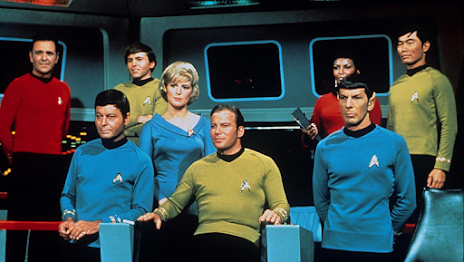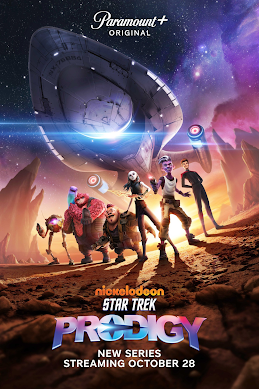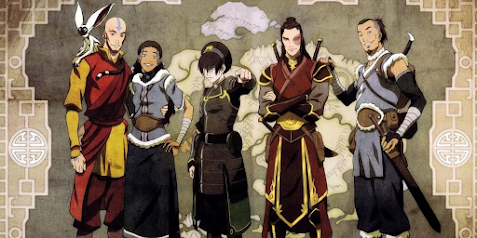Thursday, 12 June 2025
STAR TREK: STRANGE NEW WORLDS to end with shorter fifth season
Wednesday, 12 July 2023
Wertzone Classics: Star Trek: The Original Series
Saturday, 8 July 2023
Star Trek: Prodigy - Season 1
A group of workers on the Tars Lamora prison colony discover an abandoned spacecraft, the key to their escape. However, the starship is what the prison colony overseer was looking for, sparking a major pursuit operation. Dal, Gwyn, Rok-Tahk, Jankom Pog, Zero and Murf learn that they are the new owners of the Federation starship USS Protostar, a vessel equipped with an experimental drive system. Advised by an emergency advisory hologram, taking the former of Starfleet Captain Kathryn Janeway, the reluctant crew have to find a way of getting the Protostar home and avoiding their relentless pursuers.
Star Trek: Prodigy is the third animated Star Trek show, but the first primarily aimed at younger viewers. A co-project between Paramount and Nickelodeon, the show assembles a crew of alien youngsters to tell a story that, especially in the early going, feels completely disconnected from existing Star Trek settings and worldbuilding. Indeed, this is the first Trek show not to feature a single human regular castmember (Janeway being a hologram).
The first season is 20 episodes long, which is something of a relief in this age of 8 and 10-episode seasons that all too often sacrifice character development and standalone side-stories for a central arc (often one not remotely worthy of that number of episodes). This allows the show to be a bit of a slow burn as it establishes who the characters are and the problems they are facing before it punches the "story arc" button. Once it does, that arc unfolds with impressive skill, mixing both the modern-day plot of the characters trying to take their Federation ship home from the Delta Quadrant with an elaborate backstory revolving around the villainous Diviner (a superb performance by Fringe and Lord of the Rings' John Noble).
The main cast are excellent, with Ella Purnell adding to a powerfully impressive recent resume of roles (Arcane, Yellowjackets and the upcoming Fallout) with her role as the conflicted Gwyn. Comic lunatic Jason Mantzoukas (Brooklyn Nine-Nine, Parks & Recreation, Paper Girls) also imbues both Jankom Pog with expected comedy and less-expected tragic pathos.
The show's real strength is taking the Star Trek ethos of peaceful cooperation and making it work without a lot of Star Trek's baggage. Whilst Picard and Lower Decks have mined a great deal of their stories and setup from earlier shows, Prodigy goes in the opposite direction of keeping the Trek universe at arm's length its early going. Pog is a Tellarite but has little knowledge of his homeworld or culture, whilst Zero is an incorporeal Medusan (who briefly show up in The Original Series), but both are deep cuts to a casual viewer. Janeway is obviously a more familiar reference point, but as a hologram limited by her programming rather than the "real" Janeway, she is not quite the character we remember. Most of the aliens, worlds, technology and ideas the crew encounter are new and fresh, which is a genuinely impressive feat for what is the tenth television series to bear the Star Trek name.
After midseason, the show is more comfortable embracing its place in the Star Trek universe and the show's integration with more familiar settings and ideas is well-handled. Particularly successful is how the show creates a situation where our heroes simply can't immediately join forces with the Federation and instead have to search for a sneaky way of getting the Protostar back to Starfleet without causing a major galactic incident in the process. The season final wraps up this initial story arc with tremendous success, resulting in what might one of Star Trek's single finest debut seasons.
The show is not without weaknesses, however. Much of the final arc revolves around the dangers of AI which, although timely, is a story idea done to death in previous shows and only recently the major focus of both a full season of Discovery and another full season of Picard. It could also be argued that central character Dal is a bit too standard a protagonist for an animated show, being snarky but resourceful, hot-headed but kind etc. He improves a lot in the latter part of the season which his quest to understand his origins becomes more pressing. The animation is also mostly good, but perhaps a little bit of a step below the CG Star Wars shows.
There is much to enjoy in the debut season of Star Trek: Prodigy (****), enough to appeal to both established Trek fans and young children looking for a fun show. A second and final season is in production. The show is still available on Paramount+ in many countries, but in some territories it has been removed pending a move to a new station. DVD and Blu-Ray sets of the first season are available (or will be soon).
Friday, 28 April 2023
AVATAR: THE LAST AIRBENDER sequel film gets 2025 release date
Tuesday, 28 March 2023
STAR TREK shows gets new seasons and airdates
Paramount have lifted the lid on some of their plans for the Star Trek franchise moving forwards.
Star Trek: Strange New Worlds will air its second season starting on 15 June, and has been renewed for a third, confirming more adventures for Captain Pike (Anson Mount) and the Enterprise crew in the 23rd Century.
Star Trek: Lower Decks will air its fourth season later in the summer. The precise date is to be decided, but since each of the three previous seasons aired in August, that seems a fairly logical deduction for this season as well. Lower Decks has also been renewed for a fifth season, due to air in 2024.
Strange New Worlds and Lower Decks are also getting a special crossover episode as part of Strange New Worlds' third season, mixing live action and animation.
The Paramount-Nickelodeon co-production Star Trek: Prodigy will also start airing its second season before the end of the year, but has so far not been renewed. Prodigy's seasons are double the length of the norm, though (20 episodes each) and usually air in two blocs, so it might be next year before we hear any more about that show's fate.
Star Trek: Discovery will air its fifth and final season in early 2024, whilst Star Trek: Picard is currently wrapping up its third and final, warmly-received season. Whilst there have been discussions about a follow-up series, called Star Trek: Legacy, that has not been formally greenlit yet. There is also no further word on the much-discussed Section 31 TV series which has been in development hell for some considerable time.
Still, that's a reasonable amount of Star Trek to look forwards to in the foreseeable future.
Saturday, 27 August 2022
New STAR TREK movie loses director to FANTASTIC FOUR
Friday, 18 February 2022
Next STAR TREK film to reunite the Chris Pine-led reboot cast
Wednesday, 19 January 2022
Paramount renews STAR TREK: DISCOVERY, STRANGE NEW WORLDS and LOWER DECKS
Thursday, 9 September 2021
Paramount announce launch dates for new seasons of STAR TREK: DISCOVERY, PICARD and PRODIGY
Monday, 23 August 2021
DUNGEONS & DRAGONS movie wraps
Co-director John Francis Daley has confirmed that shooting has wrapped on the new Dungeons & Dragons feature film.
Shooting began on or around 29 April, with shooting based at the Titanic Studios in Belfast, Northern Ireland (previously home to Game of Thrones). Location shooting has taken place in Northern Ireland, Iceland and at Alnwick Castle, Northumberland.
Daley co-directed the film with his long-term collaborator Jonathan Goldstein. Their previous projects include the comedy films Horrible Bosses and Game Night, and writing the MCU movie Spider-Man: Homecoming.
This is, technically, the fifth Dungeons & Dragons feature, following on from three increasingly low-budget movies in the 2000s (only one of which was theatrically released) and an animated Dragonlance movie. However, this project has a vastly greater budget.
The film is set in the Forgotten Realms world and the city of Neverwinter will feature. Beyond that, little is known of the plot. The cast includes Chris Pine, Michelle Rodriguez, Justice Smith and Regé-Jean Page, who are believed to be members of an adventuring band who run afoul of a villainous plot orchestrated by Forge Fletcher, played by Hugh Grant.
The film is currently set for release by Paramount Pictures on 3 March 2023. A D&D TV series is also in development with John Wick writer Derek Kolstad developing a concept. Wizards of the Coast have teased this project may involve Forgotten Realms signature character Drizzt Do'Urden in some capacity.
Wednesday, 14 July 2021
Next STAR TREK film lands WANDAVISION director, gets green light
Paramount's next Star Trek feature film has hooked WandaVision director Matt Shakman to helm the feature.
Paramount has spent five years playing musical chairs with writers, directors and even castmembers for the follow-up to 2016's Star Trek Beyond. Quentin Tarantino and Noah Hawley both developed scripts, J.J. Abrams signed on and off as producer several times and even the film's setting and cast changed several times, with Paramount considering everything from a film featuring a completely new crew and ship unrelated to any previous version of the franchise to a remake of the classic series episode A Piece of the Action to a straight-up sequel to the previous movies, with Chris Pine's Kirk returning.
Paramount have now greenlit a completely new project, with a script by Lindsey Beer and Geneva Robertson, with Shakman signed up after he guided WandaVision to a startling 23-Emmy nomination haul. It is still unclear if this new script will see the return of the Chris Pine-led "Kelvin" timeline but that should hopefully be clarified soon as casting announcements are made. Paramount wants to fast-track the movie with shooting to start no later than Spring 2022. The film, the fourteenth overall in the franchise, already has a pencilled-in release date of 9 July 2023. J.J. Abrams will return to produce.
Meanwhile, work on the next TV instalments of the franchise are continuing. Animated series Star Trek: Lower Decks and Prodigy are expected to drop over the summer, whilst Season 4 of Discovery is gearing up for an autumn launch, ahead of Picard's second season in early 2022 and Strange New Worlds' first season a few months later.
Monday, 14 June 2021
Star Trek: Insurrection
Thursday, 3 June 2021
Star Trek: First Contact
Monday, 31 May 2021
Star Trek: Generations
Captain James T. Kirk attends the launch of the USS Enterprise NCC-1701-B. An emergency situation arises and Kirk, as usual, helps save the day, but he is apparently killed in the process. Seventy-eight years later, Captain Jean-Luc Picard of the Enterprise 1701-D is put in a desperate situation when a fanatical scientist starts destroying entire star systems. Picard is going to need some help...
With the conclusion of Star Trek: The Next Generation in 1994, a TV series that dwarfed the popularity and reach of its predecessors, Paramount was keen to move the show and its popular cast onto the big screen as soon as possible. Overriding the concerns of the production team, the film was immediately put into rotation to start shooting as soon as filming was completed on the TV show and to be on cinema screens before the end of the same year. It was a tall order, leaving the cast and crew exhausted from working on the TV show for seven years and then straight into a full-length feature film.
Some of this can be seen on screen. Star Trek: Generations (the first film in the series to drop the roman numerals) is a solid but unexceptional film, something of a surprise given it features Captains Kirk and Picard joining forces to take down a mutual threat, a charismatic villain played by Malcolm McDowell. There's some entertaining comedy beats and some very good characterisation, particularly of Lt. Commander Data (Brent Spiner) as he gets used to his "emotion chip". Most of the castmembers get at least a brief chance to shine and, in the scene where the Enterprise-D's saucer section crash-lands on a planetary surface, one of the franchise's most memorable action and effects set-pieces.
The film relies a little too heavily on the TV show for setup. Villains Lursa and B'Etor have very little motivation and if you hadn't seen them already in the TV show, you'd have no idea why them showing up is a big deal. Similarly, Guinan (Whoopi Goldberg) feels like a bit of a walking deus ex machina in the film and her character has no real arc. The story also feels a bit overworked and overcomplicated, with too many moving pieces and a TV-like approach of pressing on regardless of if the plot makes sense (Soren not being able to beam into the Nexus from a ship already feels a bit iffy, but the jump from that to blowing up entire stars to shift the Nexus's path feels extreme). The film's big ending being a fistfight between two middle-aged gentlemen and an older one on a big rock is also rather underwhelming. Destroying another Enterprise also feels a bit gratuitous, although it is at least done in an impressive manner.
Still, it's a long way from the worst entry in the Star Trek pantheon and it has fun moments. William Shatner takes a delight in hamming up every second he's on-screen, but for once this is more charming than annoying, due to his limited screen time (he has a brief appearance at the start of the film and then at the end, more of an extended camo than the promised film-length team-up). He and Stewart make for an entertaining team, even if the gulf in their respective acting abilities is more of a yawning chasm. Malcolm McDowell can do "charming but evil" in his sleep and the film packs a lot into its running time.
Star Trek: Generations (***½) isn't going to be winning any prizes for being a classic movie, but it is a solid and entertaining piece that does its job - passing the baton from one generation to another - efficiently.
Wednesday, 26 May 2021
Star Trek V: The Final Frontier
Sunday, 23 May 2021
Wertzone Classics: Star Trek II: The Wrath of Khan
Friday, 21 May 2021
Wizards of the Coast confirm FORGOTTEN REALMS setting for DUNGEONS & DRAGONS movie
Wizards of the Coast, the creators and publishers of the Dungeons & Dragons tabletop roleplaying game, have finally confirmed that the in-production D&D movie will take place in the Forgotten Realms world, ending years of speculation.
The city of Neverwinter on the Sword Coast North, a rumoured location for the film. Art: Jedd Chevrier
A much earlier, long-superseded draft of the script was set in the Realms, specifically in the city of Waterdeep and the dungeon of Undermountain beneath it, but since then the film has passed through multiple writers, rewrites and directors, leading to some confusion over the film's setting. Yesterday a film synopsis leaked placing the action in the Realms, in and around the city of Neverwinter, but according to Screenrant this is an old synopsis which is no longer completely accurate.
WotC have now confirmed that the setting is indeed the Realms, but nothing specific beyond this. This will mark the first appearance of the Forgotten Realms - history's most popular and successful epic fantasy shared world setting - in a live-action adaptation. More than 290 novels have been published in the Forgotten Realms setting, with cumulative sales approaching 100 million, well over 30 million alone sold by R.A. Salvatore in his popular Legend of Drizzt series. Authors such as Paul Kemp, Ed Greenwood, Troy Denning, Elaine Cunningham and Erin Evans have sold many millions more novels in the setting.
Around fifty video and mobile games in the setting have also been released, including the highly popular Baldur's Gate, Dark Alliance, Icewind Dale and Eye of the Beholder series. Dungeons & Dragons: Dark Alliance, starring Drizzt Do'Urden and the Companions of the Hall, will be released next month, whilst the long, long-awaited Baldur's Gate III is aiming for release next year.
The Forgotten Realms world was created by Canadian author Ed Greenwood in 1968 as a setting for stories he was writing at school. He expanded the setting as a Dungeons & Dragons campaign world in 1976 and began writing D&D articles for Dragon Magazine in 1978, frequently mentioning characters and locations from his home setting. TSR, Inc., the publishers of D&D, bought the setting from Greenwood and brought it into print in 1987. It has never been out of print since, enjoying the distinction of being the only D&D campaign setting supported for every edition of the game and the setting most frequently used in D&D-branded adventures, novels and video games. With the release of D&D's 5th Edition in 2014, the world became the "default" setting for D&D, although recently Wizards (who bought TSR in 1997) have backed off a bit on that in favour of supporting gaming groups in creating their own worlds, or using other settings.
Alongside this news, Wizards of the Coast confirmed that 2020 was the most successful year in D&D's history with over 30% sales growth on the previous year. They confirmed plans in the coming months to bring back two "classic" and long-out-of-print campaign settings (one heavily rumoured to be Dragonlance, to accompany the release of the first new Dragonlance novels in over a decade by setting writers Margaret Weis and Tracy Hickman), as well as releasing a Forgotten Realms card set for the Magic: The Gathering collectible card game.
The D&D movie is currently shooting in the Titanic Studios in Belfast, Northern Ireland, and stars Chris Pine, Hugh Grant, Michelle Rodriguez, Justice Smith and Regé-Jean Page. The film is currently scheduled for release on 3 March, 2023.















